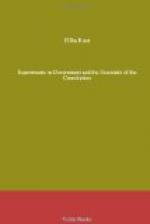The mere declaration of a principle, however, is of little avail unless it be supported by practical and specific rules of conduct through which the principle shall receive effect. So Magna Charta imposed specific limitations upon royal authority to the end that individual liberty might be preserved, and so to the same end our Declaration of Independence was followed by those great rules of right conduct which we call the limitations of the constitution. Magna Charta imposed its limitations upon the kings of England and all their officers and agents. Our constitution imposed its limitations upon the sovereign people and all their officers and agents, excluding all the agencies of popular government from authority to do the particular things which would destroy or impair the declared inalienable right of the individual.
Thus the constitution provides: No law shall be made by Congress prohibiting the free exercise of religion, or abridging the freedom of speech or of the press. The right of the people to keep and bear arms shall not be infringed. The right of the people to be secure in their persons, houses, papers and effects, against unreasonable searches and seizures, shall not be violated. No person shall be subject for the same offense to be twice put in jeopardy of life or limb; nor be compelled, in any criminal case, to be a witness against himself; nor be deprived of life, liberty, or property without due process of law; nor shall private property be taken for public use without just compensation. In all criminal prosecutions, the accused shall enjoy the right to a speedy and public trial, by an impartial jury of the state and district wherein the crime shall have been committed; and to be informed of the nature and cause of the accusation, to be confronted with the witnesses against him, to have compulsory process for obtaining witnesses in his favor, and to have the assistance of counsel for his defense. Excessive bail shall not he required, nor excessive fines imposed, nor cruel and unusual punishment inflicted. The privilege of the writ of habeas corpus shall not be suspended, except in case of rebellion or invasion. No bill of attainder or ex post facto law shall be passed. And by the Fourteenth Amendment, no state shall deprive any person of life, liberty, or property, without due process of law; nor deny to any person within its jurisdiction the equal protection of the law.
We have lived so long under the protection of these rules that most of us have forgotten their importance. They have been unquestioned in America so long that most of us have forgotten the reasons for them. But if we lose them we shall learn the reasons by hard experience. And we are in some danger of losing them, not all at once but gradually, by indifference.
As Professor Sohm says: “The greatest and most far reaching revolutions in history are not consciously observed at the time of their occurrence.”




